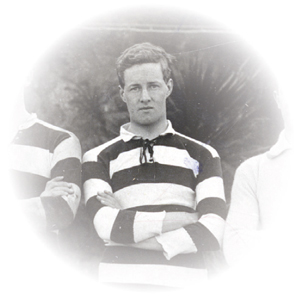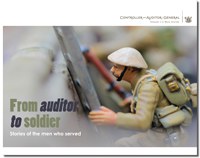Henry Charles Steere
 Henry Charles Steere was from Hawkes Bay. In January 1912, aged 13, he was awarded a scholarship by the Hawkes Bay Education Board that paid for the cost of his secondary school education.
Henry Charles Steere was from Hawkes Bay. In January 1912, aged 13, he was awarded a scholarship by the Hawkes Bay Education Board that paid for the cost of his secondary school education.
Henry joined the Audit Department in July 1916 as an Audit Examiner. He passed the Senior Civil Service Examination in January 1918 and, by then, had reached the position of Audit Examiner, Class VII, based at Wellington.
Henry joined the New Zealand Expeditionary Force in July 1918, aged 20. After joining the New Zealand Expeditionary Force, he was posted to the New Zealand Army Pay Corps, arriving in the United Kingdom in January 1919.
In August 1919, he was promoted to the rank of Sergeant and was transferred, briefly, to the Audit Department of the New Zealand Expeditionary Force. His work involved audits of the pay system, but during the war the New Zealand Expeditionary Force’s Audit Department had a much wider brief.
In a memorandum dated 19 March 1918, the Major in charge of the Audit Department in London outlined the types of audits that were carried out. He described how the cash receipts of the New Zealand Expeditionary Force are sent to the Government Audit Department in Wellington. However, the New Zealand Expeditionary Force felt it was necessary to conduct additional audit checks. Their first auditor was employed in late 1917. Six months later, the New Zealand Expeditionary Force audit team had grown to nine staff, based in London.
The type of audit work carried out by the team included surprise visits to bases, hospitals, and munitions depots, to check stock levels and adherence to accounting procedures.
In December 1920, Henry was discharged from the New Zealand Expeditionary Force but stayed in London. He rejoined the Audit Department and was appointed to the position of Audit Examiner, Class VII, based at London. He worked in London for most of the 1920s.
At the start of WW2, Henry was still working for the Audit Department, based in Wellington.
On 23 February 1940, the Controller and Auditor-General wrote to the Army Secretary, Defence Department, advising that Cabinet had approved two senior Audit Department staff members being called up to join the 2nd New Zealand Expeditionary Force to audit expenditure. This work would require them to be based overseas.
In agreement with the Chief of General Staff, one of the auditors was to be given the honorary rank of Major and the other person would be given the honorary rank of Lieutenant. The two staff were Henry (who became Major), and Eric Tindill (the “double All Black” who represented New Zealand in rugby and cricket, and who became Lieutenant). In his letter to the Army Secretary, the Auditor-General said that the two staff members would be subject to the disciplinary control of the Base Commander but for all other matters they would be responsible to the Auditor-General.
Henry was aged 41 at the time of his call up. He was a single man, but, before being sent overseas, he became engaged, on 1 April 1940, to Janet Little of Wellington. On 3 April 1940, he was posted to the New Zealand Army Pay Corps at Palmerston North, before being sent overseas in May 1940. He was posted first to the United Kingdom and then to Egypt, where he was in charge of the Audit Branch at New Zealand Expeditionary Force Headquarters.
Henry’s work must have been outstanding. In March 1942, he was promoted to the honorary rank of Lieutenant Colonel. In June 1942, his work was further recognised when he was Mentioned in Despatches. In June 1944, he was posted to Rome. His work was again recognised when, in January 1945, he was awarded the Order of the British Empire (OBE). The citation for the award said that:
Lt.Col. Steere’s professional skill, industry and devotion to duty over a period of four and a half year’s overseas with the Audit Branch, 2nd NZEF was of the highest order and he made a most valuable contribution to the efficient administration of 2nd NZEF.
In May 1945, a published report from Lieutenant-General Sir Bernard Freyberg to the Minister of Defence, described the administrative services provided to the 2nd New Zealand Expeditionary Force during the war. In the course of praising the support services, General Freyberg said:
Chief Auditor Lieutenant-Colonel H C Steere and his staff have helped us in all our financial and accounting problems.
In September 1945, Henry relinquished his position of Chief Auditor and was posted back to New Zealand. The Army recognised that he was well overdue for leave in New Zealand. He had served overseas for five years, had been hospitalised twice, and had accumulated more than 90 days of leave. His replacement was flown out rather than being sent by sea, to lessen the time that Henry would have to remain at his post.
Back in New Zealand, Henry was granted a long period of leave. He married Janet Little in October 1945 at St Paul’s Cathedral, Wellington. A newspaper article describing the wedding said that the bride wore a white silk dress and a beautiful full length veil of Brussels hand-embroidered net from Venice, a gift from her brother, Sergeant Gordon Little, who was serving overseas.
In the following year, a notice in the New Zealand Gazette, dated 14 April 1946, advised that Lieutenant-Colonel H C Steere, OBE, had been posted to the Retired List.
Henry was awarded several honours for his service during WW2. As well as the OBE, he was awarded the 1939-45 Star, the Africa Star, the Defence Medal, the Oak Leaf Emblem (Mentioned in Despatches), and the New Zealand War Service Medal.
At the time he retired from the Audit Department in 1956, Henry was an Audit Examiner in Wellington.
Henry died at Wellington on 23 August 1980.

